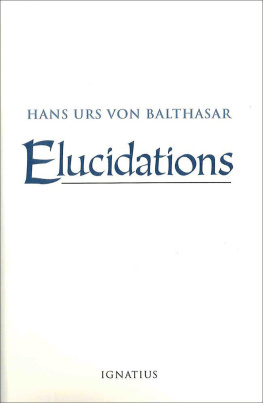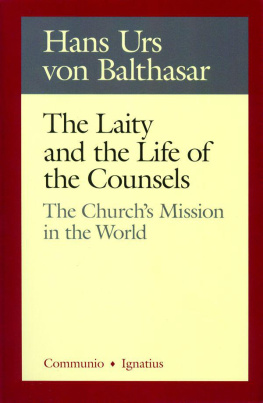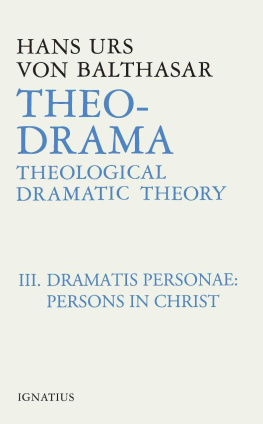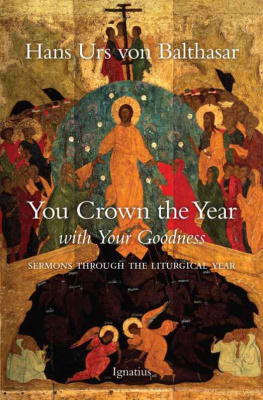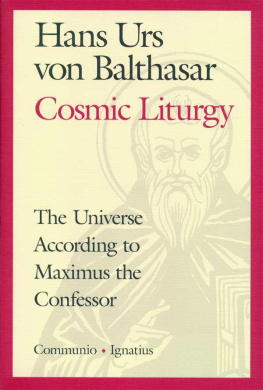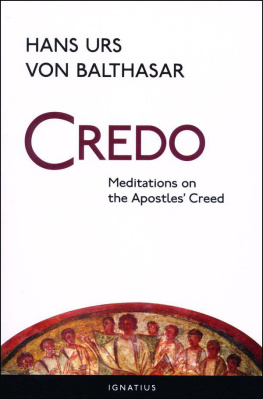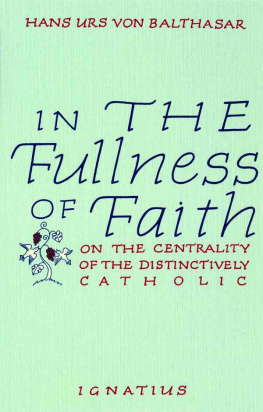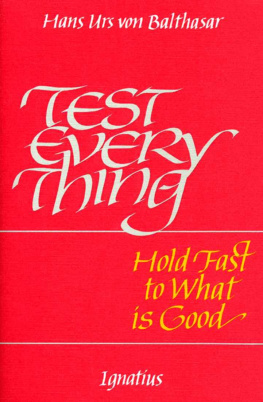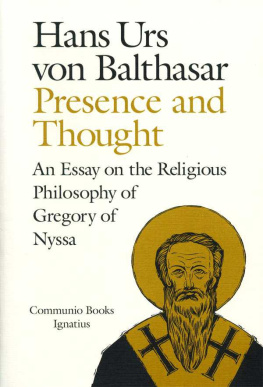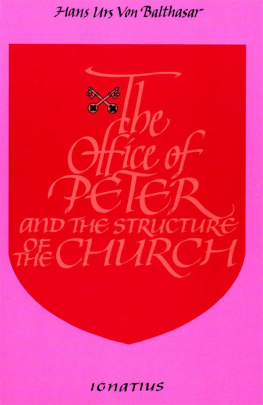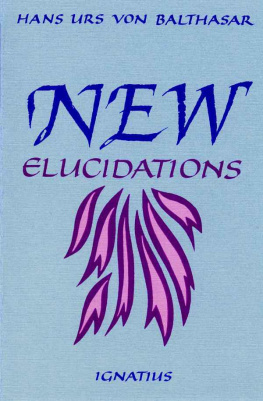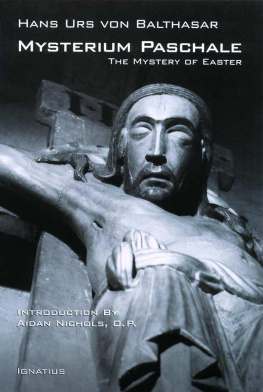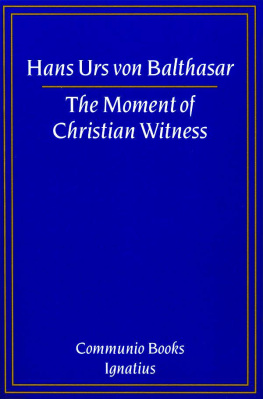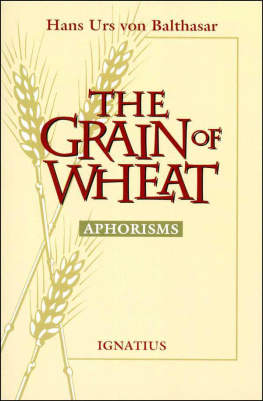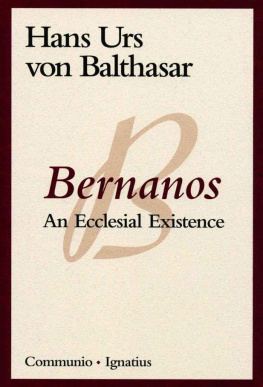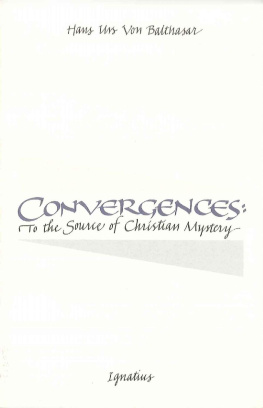ELUCIDATIONS
ELUCIDATIONS
Hans Urs von Balthasar
TRANSLATED BY
JOHN RICHES
IGNATIUS PRESS SAN FRANCISCO
Title of the German original:
Klarstellungen: zur Prfung der Geister
1971 Verlag Herder KG, Freiburg-im-Breisgau
First published in English in 1975
by S.P.C.K., London
Translation by S.P.C.K., 1975
Reprinted with permission
Biblical quotations taken from the
Revised Standard Version of the Bible,
1946, 1952, and 1957 by the Division of Christian Education
of the National Council of the Churches of Christ
are used by permission.
Cover by Roxanne Mei Lum
This edition by permission of Johannes Verlag, Freiburg-im-Breisgau
Published in 1998 Ignatius Press, San Francisco
ISBN 0-89870-621-1
Library of Congress catalogue number 98-78007
Printed in the United States of America
CONTENTS
Preface
The object of these elucidations is to offer a concise and summary treatment of a few essential questions concerning the substance of the Christian life, experience, and faith, which today are in dispute oras is true of the majorityare disappearing into oblivion. Each chapter stands on its own; the order is of no importance. Together they bear witness to an underlying view of things; they are a few rays which all radiate from the same center. Much which today arouses passion remains untreated, not because one is afraid to get involved at close quarters, preferring to take his stand behind less dangerous positions, but for a variety of reasons. In some cases the question would require a more detailed treatment; in others it could only be decided by a positive decision of the Church; in yet others it has only been artificially turned into a burning problem and that perhaps because one avoids the true burning center oneself. It is often the case that what fires me, the lukewarm Christian, does not touch the one who is truly afire, and what nearly destroys the latter does not disturb me in any manner.
If these few rays do indeed proceed from the true sun, then perhaps one could on that basis calculate the center of the fire from which our questions would be shown to be truly burning and often would nearly be solved. Much, however, which seemed to me simple and unquestionable could perhaps, unheeded, turn itself into a question mark.
Much is offered in a concentrated form. Those who find pieces like Trinity and Future or Christianity as Utopia too compressed should pass them over. There are, however, many things which become clearer by compression. I would ask you, then, not simply to read over difficult passages but to resolve them in subsequent reflection. There is much which overlaps, but one should exercise patience, for there are Christian things which only come home to one through repetition.
Certain problems today are given excessive publicity; men try to exalt them by force into articles by which the Church stands or falls. They are practically all problems which men try to solve by smoothing over or playing down the difficulties, by suggesting, supposedly out of sympathy for mens needs, the easier way. And yet in the long run it is the narrow way which attracts the best men. It is, for example, well known that monasteries which have preserved the strictness of their discipline undiminished today still have new postulants, whereas those who prefer a softer line seem to be despised by God and men. That is only intended to be taken as a symptom. The one who makes demands (but he must also give evidence that he has much to offer and must only make his demands for God and his work) still has a chance of being heard. It is part of the definition of fashion that it will change next year. That which is truly Christian was fortunately never fashionable, not even in the so-called Christian ages.
What little is said here is without pretension. One can only wonder, when reading many present-day books, how much expertise and skill have been squandered on unfruitful matters. But then one may draw comfort from Hofmannsthals dictum, the most dangerous sort of stupidity is a sharp understanding. So one can accept it happily enough if one is thought of as simple and a little weak-minded.
A Verse of Matthias Claudius
If someone receives a present from a friend, what should he then not do? There are a hundred ways of saying the wrong thing, and so it is best to get it right straightaway. Thank you! It makes me very happy! I am so pleased to have it! I think its beautiful! It will remind me of you! Then the recipient too causes joy and happiness. Nothing could be simpler than that, and without question it is right.
If, however, one departs from this simplicity and begins to divide what is indivisible, then it is remarkable what a variety of false reactions can be discovered and developed. In the first place, one can pretend not to want it: Oh, thats much too beautiful for me, and far too good for me. Id much prefer you to have it, wont you take it back and use it yourself? Youve got a much better safe and I might lose it. And my taste is much poorer than yours. Youre surely a much better judge of its value than I am. Or one might sound a note of mistrust: Why on earth did he give that to me? Whats behind it? Does he want to make me feel indebted to him? Is he trying to entangle me with his presents? Or does he want to humiliate me, because he knows that I cant give him anything of equivalent worth in return? How difficult it is to be so indebted without being able to make adequate return! We can, however, try to get rid of this rather oppressive sense of obligation by indulging in more fantastic speculations: What if the present doesnt come from him at all? If someone or other has sent it under a false name in order to play me a malicious trick and will die laughing when he gets my moving letter of thanks? I must first examine the matter thoroughly and find out who really has sent it. One can also subject the present to a really thorough examination. Is it really genuine? Is it silver or plate or merely a cheap imitation? Is it an original or mass-produced? Has it been cast in one piece, or has it been stuck together? And if the latter, from how many parts and elements? Then one breaks up the thing into its individual components, and in this state it no longer looks like anything at all and only confirms ones suspicion. If one looks at the matter more closely, more soberly, more critically, then the whole thing (but now, of course, it is not a whole thing any longer) is revealed as a fraud. I wonder what he paid for it? At first sight it gave the impressionas was, of course, intendedof being a very valuable, indeed almost priceless, piece. It was intended to create such a belief and that such belief should lead to a corresponding gratitude. One can see the intention. But something simpler would have rung more true. Next time I go shopping I will take the piece along and go into a few shops and ask how much they are worth. Unfortunately, probably very little. I cant sell it back. But at least I can work out how much the giver has been prepared to lay out on me. And then, at last, I will find out what his loudly proclaimed love is really worth.
Do you see there stands the moon?
It is but half in view,
And yet is round and beautiful!
So too are many things
We lightly laugh to scorn,
Because our eyes fail to see. ( Matthias Claudius )
The criticism of Christianity is a highly exasperating matter. The nearer one gets to the details, the stronger the lens one takes to examine them, the more incredibly banal and cheap everything appears. And yet criticism is such an invaluable instrument, indeed the most reliable which God (or God-nature) has given to us men that we might work our way up from a state of primitive humanity to the highest state of the superman. As soon as any of the accepted criticism of our day is labelled uncritical, then it is simply out of date. If you can prove that a professor has accepted something uncritically, he will have forfeited a large measure of the brightness of his halo.
Next page
